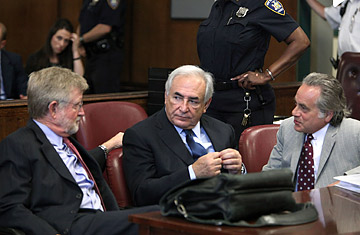
Former IMF chief Dominique Strauss-Kahn, center, appears at an arraignment trial for sexual assault with his lawyers William Taylor, left, and Benjamin Brafman, right, in Manhattan on June 6, 2011
The scrum of reporters assembles in the pre-dawn quiet two blocks from the border of Chinatown. It is Monday, June 6, and more than two hours before Dominique Strauss-Kahn is scheduled to make an appearance, but it doesn't matter. The curtain is about to lift on the preamble to what might turn out to be the trial of the century, and the courtroom has precious few seats. Two hours early might be too late.
After being herded through metal detectors, we ride the nearest elevator to the 13th floor. The doors open, and middle-aged Europeans to my left and right take off in a dead sprint. I don't realize why until I see a line assembling behind a velvet rope: the people are seeking admission to an exclusive club. I played two sports in college, and though I'm well out of my prime shape, I am able to catch up and elbow my way into the throng.
The hallway outside of Part 51 at the Manhattan criminal court looks like an old, crumbling train station. Faded marble walls flank scuffed green linoleum floors; a sign over one restroom reads "Public Toilet-Women." There is little air conditioning, and soon the hallway became stifling with the cluster of humanity. Inside the courtroom, the white walls are half covered with faded wood paneling, and the benches for the observers might resemble church pews, save for the wood dividers separating one person's bum from the next.
The crime Strauss-Kahn is accused of committing allegedly occurred in a $3,000-a-night hotel suite in midtown Manhattan. When he was arrested, he was yanked from a first-class seat on a flight to Paris. What might he be thinking as he sits in this aging hall of justice, little changed since it was built in 1941 under Mayor F.H. LaGuardia?
After a few minutes, two enormous gentlemen sit right in front of me in the first row, nearly blocking my view. I think they are detectives until I recognize their faces from the pictures of the defendant being led from his temporary home. They are his bodyguards, probably hired by Stroz Friedberg, the firm handling Strauss-Kahn's security to the tune of $200,000 a month.
Outside, maids from the New York housekeeping union wear uniforms of light blue, black and white. They stand arm in arm protesting the alleged mistreatment of one of their own. In the rest of the building, dozens of trials are under way: people accused of drug possession or DUIs or assaults plead guilty and not guilty, and are sentenced or set free. But in Part 51 on the 13th floor, reporters from around the world wait silently, their cell phones in their laps, having been told repeatedly that any attempted picture taking will result in confiscation. Strauss-Kahn finally walks in dressed in a black suit and dark blue tie. He is stone-faced as he takes his seat next to Benjamin Brafman, the legendary defense lawyer who wrote the book, or at least the lectures, on the trial process.
When the bailiff reads the charge, Strauss-Kahn and his lawyers stand up. In past decades, the reporters would have been ready, pens and pads in hand; today they hold their breath as they clutch their phones and Strauss-Kahn utters the two words everyone knows is coming: "Not guilty." The defense requests that the prosecution present all relevant information within a 45-day period of discovery. Judge Michael J. Orbus agrees and sets the date for the next hearing: July 18, at 2 p.m. E.T.
The court officers bellow, "Thank you, ladies and gentlemen. Please rise and move out of the courtroom." The scrum prods its way out the doors to what looks like a horse pen set up in front of the building, where each side fires their opening salvos. Brafman calls the two-word plea a "powerful statement." Kenneth P. Thompson, representing the accuser, says she is a woman of dignity and respect; all she wants is justice. As more than a hundred reporters clutching cameras and recorders fight for position, an old lawyer says to me, "I've seen a lot of trials here. I was here for the trial after John Lennon was shot. I've never seen anything like this." But as they'd say in a potboiler, we ain't seen nothing yet.
